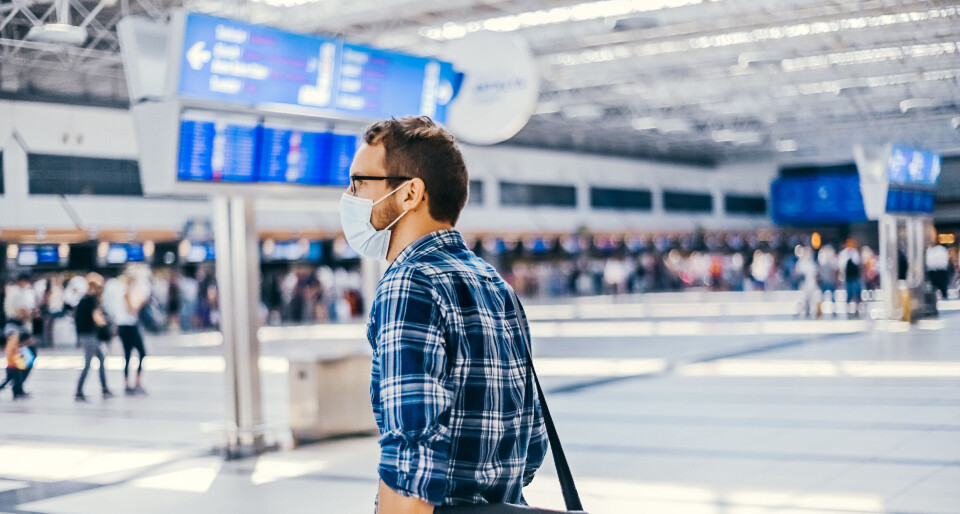-
New Paris-Jersey direct flight to launch this summer
Loganair route forms part of Channel Island’s tourism boost plan
-
Death of right-wing protester in Lyon sparks fears of further political violence
Quentin D, 23, died after reportedly being ambushed by far-left activists near site of political conference
-
Red flood alerts continue in south-west - and more heavy rain expected
Garonne river is particularly affected. French weekly weather forecast February 16 - 20
France reviews stricter rules for UK arrivals: what are the options?
Government spokesperson Gabriel Attal has said that reinforced measures may be necessary as reported cases of the Covid variant Omicron rise rapidly in the UK

France’s official government spokesperson Gabriel Attal has suggested that restrictions on UK travellers to France could be tightened as Omicron cases rise rapidly.
“At the moment, you know that we have a rule on [presenting] a negative test result from less than 48 hours before entering France,” he said during an interview with Franceinfo this morning (December 14).
“Obviously, we are still looking to see how we can further reinforce our border controls,” he added.
It was then pointed out to Mr Attal that the rules for entry into the UK are currently stricter than those for entry into France, with travellers having to carry out tests both before leaving France (PCR or antigen) and then also within two days of their arrival (obligatory PCR). They must isolate until they receive a negative result of the second day two PCR test.
Read more:Travel between France and UK: Three Covid tests now needed
He was asked how the government could be sure that people who have only carried out a pre-departure test (antigen or PCR) before travelling to France would not arrive and begin mixing with others while carrying the virus, which has an incubation period of several days.
“We have recommendations on the reduction of social contact once you are in France,” Mr Attal replied. “But as I have said we are looking at how we can reinforce our [rule] framework, and this work will be concluded, I think, within the next few days.”
🗣 Variant Omicron : la France va-t-elle renforcer ses règles d'entrée ? La réponse de Gabriel Attal, porte-parole du gouvernement, sur franceinfo pic.twitter.com/yKm5Qx2LzJ
— franceinfo (@franceinfo) December 14, 2021
He did not specify what this “framework” may entail. However, we can identify three scenarios which could materialise.
1. Testing requirements
In order to more effectively block the entry of positive Covid cases into the country, the French government could potentially also require people travelling from the UK to take a PCR rather than an antigen (or PCR) test before departure.
PCR tests return more reliable results but are more costly than their antigen equivalent and take longer to come back.
France does not currently impose a pre-departure PCR test stipulation on any groups of travellers and it is unlikely that it would come into force for people from the UK without it first being required for people from ‘scarlet list’ countries such as South Africa and Mozambique.
However, France did previously impose PCR testing requirements at the height of the Covid surge which took place over the winter of 2020-21.
If France does not impose a pre-departure PCR test requirement, it could still tighten the timeframe in which travellers can take an antigen test. This currently sits at 48 hours, but it could potentially be brought down to 24.
2. Essential reasons for travel
Looking back at measures brought in for the Delta variant, people could also be restricted for entry to France to only travellers who present an essential reason for travel, regardless of their vaccination status.
The list of essential reasons did not include tourism or visiting a second home in France although it did include people returning to France if they live here.
In the past, France has even imposed an outright ban on travellers from countries such as the UK, with exemptions only applying to French nationals, residents and hauliers.
3. Quarantine
As the Delta variant spread across the world, arrivals to France from the UK were also asked to self-isolate for seven days on arrival in France, although this ended up being a voluntary measure without any checks.
As of yesterday (December 13), 4,713 Omicron cases had been confirmed in the UK, and the number is now doubling every two to three days.
So far 133 cases of Omicron have been recorded in France but it should be noted that the UK is sequencing a higher proportion of cases and so is certain to detect more.
Despite the disparity between these figures, the UK’s infection rate remains very similar to that of France. Santé publique states that France’s rate is currently 503.4 per 100,000 people, while in the UK it is 505.5.
The Omicron variant is thought to be significantly more transmissible than Delta, reports the BBC, but could also be a milder form of the virus.
During today’s interview, Mr Attal also stated that “there are no plans to change the rules” for people living in France before Christmas, and simply urged people to get vaccinated if they have not already done so.
🗣 Covid-19 : il "n'est pas prévu de changer les règles" d'ici Noël, déclare Gabriel Attal, porte-parole du gouvernement, sur franceinfo pic.twitter.com/YlqF63DZiZ
— franceinfo (@franceinfo) December 14, 2021
He referred to the situation in the UK, where Prime Minister Boris Johnson has spoken of a “tidal wave” of Omicron cases, and added that “the decisions that they are taking now – accelerating the booster campaign and opening it to everyone – are the choices we made several weeks ago.
“The key is to continue with vaccinations, with boosters. There are currently more than 15 million people in France who have received their booster dose. We must obviously keep going, go beyond this.”
Related articles
Omicron, tests, guests: Official guidelines for Christmas in France
Covid boosters and French health passes: what changes this week?
























